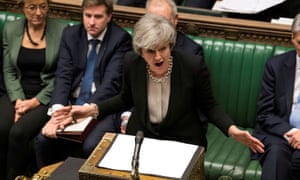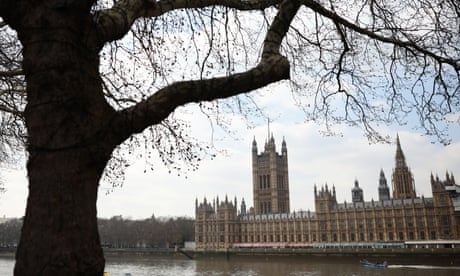Tom Kibasi
 So we now know that the third attempt at the meaningful vote will not take place this week. In its place, the government will instead hold a vote on the divorce deal only – the withdrawal agreement – setting aside the future partnership for now.
So we now know that the third attempt at the meaningful vote will not take place this week. In its place, the government will instead hold a vote on the divorce deal only – the withdrawal agreement – setting aside the future partnership for now.
This is a desperate attempt to meet the European council’s conditions for offering an extension to 22 May. If the withdrawal agreement does not pass this week, the UK will almost certainly be required to participate in European parliament elections as a condition of an extension beyond 12 April. Passing the withdrawal agreement without the political declaration would meet the conditions of the European council for the extension, but would not satisfy the domestic ratification requirements which would require a further act of parliament.

Why are MPs going to vote on just the Brexit withdrawal agreement?
Moreover, it tells us that if the withdrawal agreement were ever to pass, the period afterwards would continue to be dominated by Brexit division. A new date would loom over British politics: whether at the end of 2020 the UK would be able to ratify a trade deal with the EU, extend the transition, or enter the dreaded backstop.
Theresa May’s latest manoeuvre almost certainly won’t work, and a general election to resolve the impasse seems increasingly likely – but tomorrow’s vote may help the Tory case in that election. The vote on the withdrawal agreement, even if it falls, would show that most Conservatives had fallen in line behind it. So the agreement would effectively become their manifesto in a Brexit election: “Vote Conservative, just get out”. Ironically, it would be the election that May had hoped to fight in 2017 when, instead of focusing on Brexit, voters concentrated on domestic concerns.
If an election were to occur, it seems likely that it would be scheduled for 23 May. That is the day European parliament elections are due to take place, meaning voters wouldn’t be asked to go to the polls twice. The UK’s participation in those elections is a condition set by the European council for the extension of the article 50 period beyond 12 April. It seems plausible that the Conservatives would promise that if they were given a majority at the general election, they would immediately pass the withdrawal agreement so that Britain could exit the EU before MEPs would take up their seats on 2 July.
The only appropriate course now is to endure the humiliation of applying for a long extension and going back to the drawing board
The origins of the current crisis are to be found in the foolishness of the prime minister’s strategic response to the 2017 general election. If a close result in the 2016 referendum wasn’t a clear enough indication that a compromise would need to be found, then the 2017 general election that handed no majority to any party should have made the necessity of a cross-party approach obvious. It is absurd that days before we are due to leave the European Union, MPs are for the first time expressing their preferences in parliament rather than the TV studios and online. Attempting to conclude a process where it should have started is not a recipe for success.
It is simply delusional to think that parliament can deliver in days what the government has failed to achieve in nearly three years. The absence of a majority for any Brexit outcome that is available at this stage should not be a surprise. The close result was best understood as an instruction to secure our economic partnership on a new political basis that would honour the vote to leave, but secure the consent of those who voted to remain. But the nature of such a relationship is that it is complicated, and must be carefully and painstakingly negotiated, even at the relatively high level of the political declaration. It would need to outline the principles for the new relationship and the new architecture of rules and institutions necessary to structure it. There is no way that such a complex arrangement can be negotiated with the EU with just days to go before the 12 April deadline.
So it is time for Britain’s political class to accept that it has comprehensively failed.
Spartans don’t hug it out. Except for Jacob Rees-Mogg and Steve Baker
Marina Hyde
The Brexit promised in the 2016 referendum does not exist and never could. Brexit was always a mirage: appealing from a distance, but with nothing really there. The unfolding chaos has been an affront to our national interests and to our national dignity. The only appropriate course now is to endure the humiliation of applying for a long extension and going back to the drawing board. That would open the way to negotiating a credible proposal that could be put to the people in a further referendum, with an honest assessment against continued membership with our current deal – in the EU, out of the euro, and with a sizeable rebate on our subscription fees. That is a deal that the rest of the world thinks is unbeatable.
We are in desperate need of serious political leadership that can explain to the country how we got to here and how we can move forward.
The untold truth is that our problems are our own. We live in an age of profound social and economic injustice caused by decisions made in Westminster, not in Brussels. Brexit has been a colossal distraction from confronting them and has only further eroded trust in the capacity of our institutions to solve them.
It’s time for politicians to ask the people for their forgiveness, to take responsibility for their mistakes, and to guide the country out of the void that they have steered us into. But that wasn’t on the ballot paper in the indicative votes last night, and won’t be in the government’s motion tomorrow.
• Tom Kibasi is director of the Institute for Public Policy Research
As Brexit looms…
... The Guardian is here to help guide you through whatever lies ahead. More people are reading and supporting our independent, investigative reporting than ever before. And unlike many news organisations, we have chosen an approach that allows us to keep our journalism accessible to all, regardless of where they live or what they can afford.
The Guardian is editorially independent, meaning we set our own agenda. Our journalism is free from commercial bias and not influenced by billionaire owners, politicians or shareholders. No one edits our editor. No one steers our opinion. This is important as it enables us to give a voice to those less heard, challenge the powerful and hold them to account. It’s what makes us different to so many others in the media, at a time when factual, honest reporting is critical.
No comments:
Post a Comment